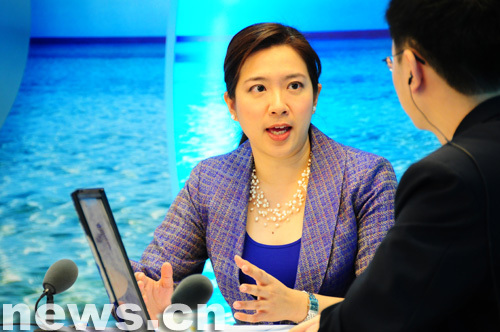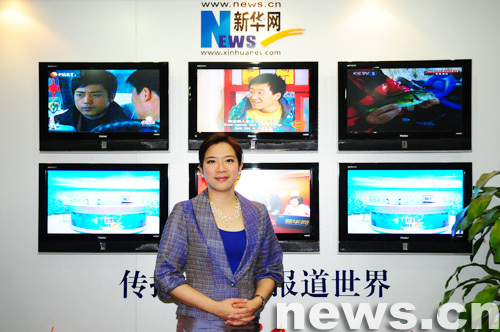BEIJING, Jan. 29 (Xinhuanet) -- The Thai government has made special efforts to advance the operation of the China-Association of Southeast Asian Nations (ASEAN) Free Trade Area (FTA), said a Thai diplomat during an interview with Xinhuanet.
Meanwhile, the governmemt has always been welcoming people seeking investment chances in the country, said Kanyarat Bhanthumnavin, First Secretary of the Royal Thai Embassy in China.
 |
| Kanyarat Bhanthumnavin, First Secretary of the Royal Thai Embassy in China, speaks during an interview with Xinhuanet in Beijing, on Thursday, Jan. 28, 2009. (Xinhua Photo) |
The idea of forming such a free trade area dated back to the Asian financial crisis in the 1990s. Thailand chaired ASEAN from 2009 to 2010.
"Thailand took over the chairmanship at a very important time for ASEAN. It was the year when ASEAN ratified the ASEAN Charter, a structure and platform for institution building." said the diplomat.
As chair, Thailand promoted ASEAN people's understanding of what ASEAN is there for them and how ASEAN, including the China-ASEAN FTA, as an institution, can improve their life.
 |
| Kanyarat Bhanthumnavin, First Secretary of the Royal Thai Embassy in China, poses for a photo before an interview with Xinhuanet in Beijing, on Thursday, Jan. 28, 2009. (Xinhua Photo) |
"One concrete achievement that Thailand is very proud of is the (signing of the) agreement on investment, which is part of the three pillars (i.e., the political, economic and socio-cultural pillars) of FTA," Bhanthumnavin put out.
As most of the key existing FTAs are dominated by developed countries, the influence the China-ASEAN FTA, whose members are mostly developing countries, can have on the world economy as a whole still needs to be seen, said Bhanthumnavin.
She added economists hope the emergence of the new FTA will actually encourage people to come together and see the benefit of FTAs, and try to distribute the concept of free trade at a global level.
As to the future development of the new network, the diplomat pointed out details in the FTA remain to be worked out further, such as the details of how to facilitate trade, issues of standards, quality and non-tariff barriers.
The China and ASEAN FTA started operation on Jan. 1, with the aim to boost trade cooperation and bilateral investment between China and the ten ASEAN nations.
As the world largest FTA in terms of population, it involves 1.9 billion people and a combined gross domestic product close to 6 trillion U.S. dollars.
Within its framework, the average tariff on goods from the ASEAN member countries to China is cut down to 0.1 percent from 9.8 percent.
The six original ASEAN members, Brunei, Indonesia, Malaysia, the Philippines, Singapore and Thailand, will slash the average tariff on Chinese goods from 12.8 percent to 0.6 percent.
By 2015, the policy of zero-tariff rate for 90 percent of traded goods is expected to extend between China and the four new ASEAN members, Cambodia, Laos, Myanmar and Vietnam.
On Thai efforts to attract foreign fund and the availability of incentives for investors, she said, the Board of Investment of Thailand (BOI), a one-stop service for foreign investors interested in Thailand, takes specifical charge of investment promotion in Thailand.
"The BOI also has an office in Beijing... We would be pleased to welcome people seeking investment in Thailand," she added while talking about the opportunities and challenges the China and ASEAN FTA will bring.
The incentive schemes have already been in place at the BOI, she added.










